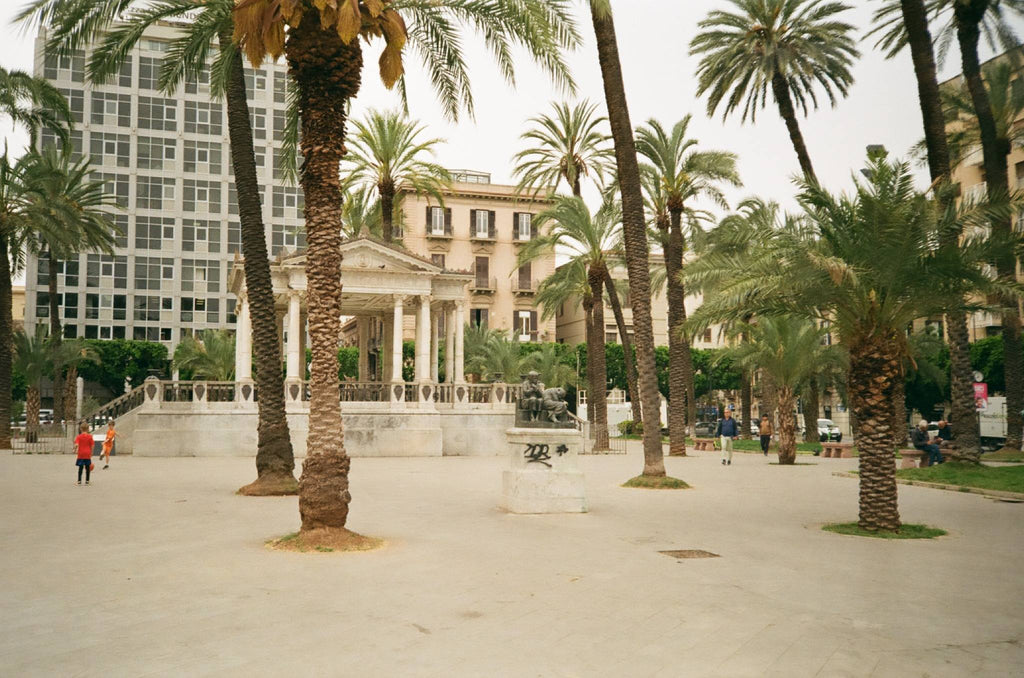Away Days — Palermo
Naomi Accardi, the football creative force (and friend of Futsol) invites us on a weekend break to her adopted Italian city.
Naomi Accardi, the football creative force (and friend of Futsol) invites us on a weekend break to her adopted Italian city.

Eat: Trattoria Al Vecchio Club Rosanero
Drink: Ai Vini D’Oro
Watch football: La Traviata
Visit: Historical Centre
Shop: Odja
A pearl in the middle of the Mediterranean, Palermo is a city of many contrasts. Its opulent buildings, reminiscent of an abundant past, are left to rot under the bright sun.
The air smells sweet in the morning, with the scent of warm bread sneaking out of the ubiquitous bakeries, but it quickly changes as bags of trash pile up on the street. On one flank, the sea glistens in silence, relaxing the mind. On the other side, dark mountains cast shadows over the metropolis, acting as an amplifier for the loud noises typical of the city–agitated car horns, street vendors promoting their merchandise, women conversing with friends from their balcony.
Palermo is one of a kind. A fascinating blend of beauty and disgrace, perfectly represented by the local club’s colors.

There’s a funny slogan found on the fan merchandise sold by street vendors in Palermo. It goes, “Sono bello, sono sano, mia mamma mi ha fatto Palermitano” (translation: I am beautiful, I am healthy, my mother made me Palermitan). It alludes to local pride and suggests a strong sense of belonging and passion for the pink and black colors that represent the football club and, ultimately, the city. For me, this funny line is the emblem of my connection to this magnificent Mediterranean pearl.
As the daughter of a Palermitan man and a Modenese mother who chose to give birth in her hometown, according to the ius soli principle, I should consider myself an Italian from the North. After all, I was born and raised in the Pianura Padana for a big chunk of my childhood, coming to Sicily only to visit my paternal side of the family during school breaks. However, I have always felt a more acute affinity for Palermo than the tiny, foggy town where I grew up.
Its chaotic yet melancholic energy, the openness of its people, the vast diversity of its cuisine, from the sweetest desserts, to the spiciest peppers, Palermo has the ability to seduce anyone.
Maybe it’s my appearance—the fizzy, curly hair and my fair skin with an olive undertone—a stark representation of the centuries of Arab domination on the island—or my penchant for dramatic gesticulation and fiery character. But after a decade of living abroad, shaping my adulthood and sense of self on foreign soils, it is only when I chose to settle in Palermo that I truly felt at home.

Borgovecchio is the neighborhood where I live, shop and mingle. It is a very interesting district, where you can still find traditional boutiques and street vendors selling food items or the knife grinder driving around yelling that he has arrived. There is a small football pitch that’s incredibly charming. Ai Vini D’Oro is a wine shop that doubles as a bar and it’s probably one of the most authentic places you can find in the city. The owners are incredibly kind and passionate and they will welcome you with a smile on their face no matter the day and time.

Trattoria Al Vecchio Club Rosanero — This restaurant needs no introduction. I think it’s one of the most amazing places in the city. It's a pure football craze. There are pieces of merchandise and items that I have never seen anywhere else. Just fantastic. The food is delicious, like grandma’s cooking, and affordable.

The “Foro Italico” is essentially a huge park and promenade on the waterfront which stretches from the commercial port to the Kalsa neighborhood, for approximately one kilometer. It’s a wonderful green space which on the weekend becomes a destination for families and friends, and where–mostly men–gather to play football. There is a small, well preserved 5vs5 pitch as well. Street vendors and the famous “stigghiolari”, vendors grilling sheep’s intestines, can be found here at all times.
“La Magione” is a particularly fascinating park in the heart of the historical center as it stands on what’s left of what used to be public housing after the WW2 bombings. It’s also the place where famous mafia prosecutors Falcone and Borsellino were born and raised. It features one of the many public football pitches that can be found throughout Palermo, unfortunately this one is also not so well kept.

Palermo is a city full of heritage, culture and folklore. As the island’s capital, its history is layered and complicated, having been the backdrop to multiple conflicts, but it’s also a place full of inspiration. Football is of course central. Residents miss no chance to show their pride for their club’s colors, with flags waving from balconies and windows, merch sold on every corner and graffiti celebrating the team. In this particular selection, I wanted to highlight two things that are omnipresent in this city: football and religion. Whilst you’re here, visit Ojda, the hottest bar in the city with a local creative crowd. In the back, there’s a shop selling a local fashion brand and a small selection of vintage homeware.